Keystone Tutors is a UK-based private tutoring agency founded in 2007. It offers one-on-one and group tutoring primarily for British-style curricula and exam prep. This article gives students and parents an overview of Keystone Tutors to help them compare it with other platforms.
We cover Keystone’s reviews, prices, services, and how it works, as well as compare it to alternatives (including My Engineering Buddy). The goal is to provide clear information so that families can make informed choices.
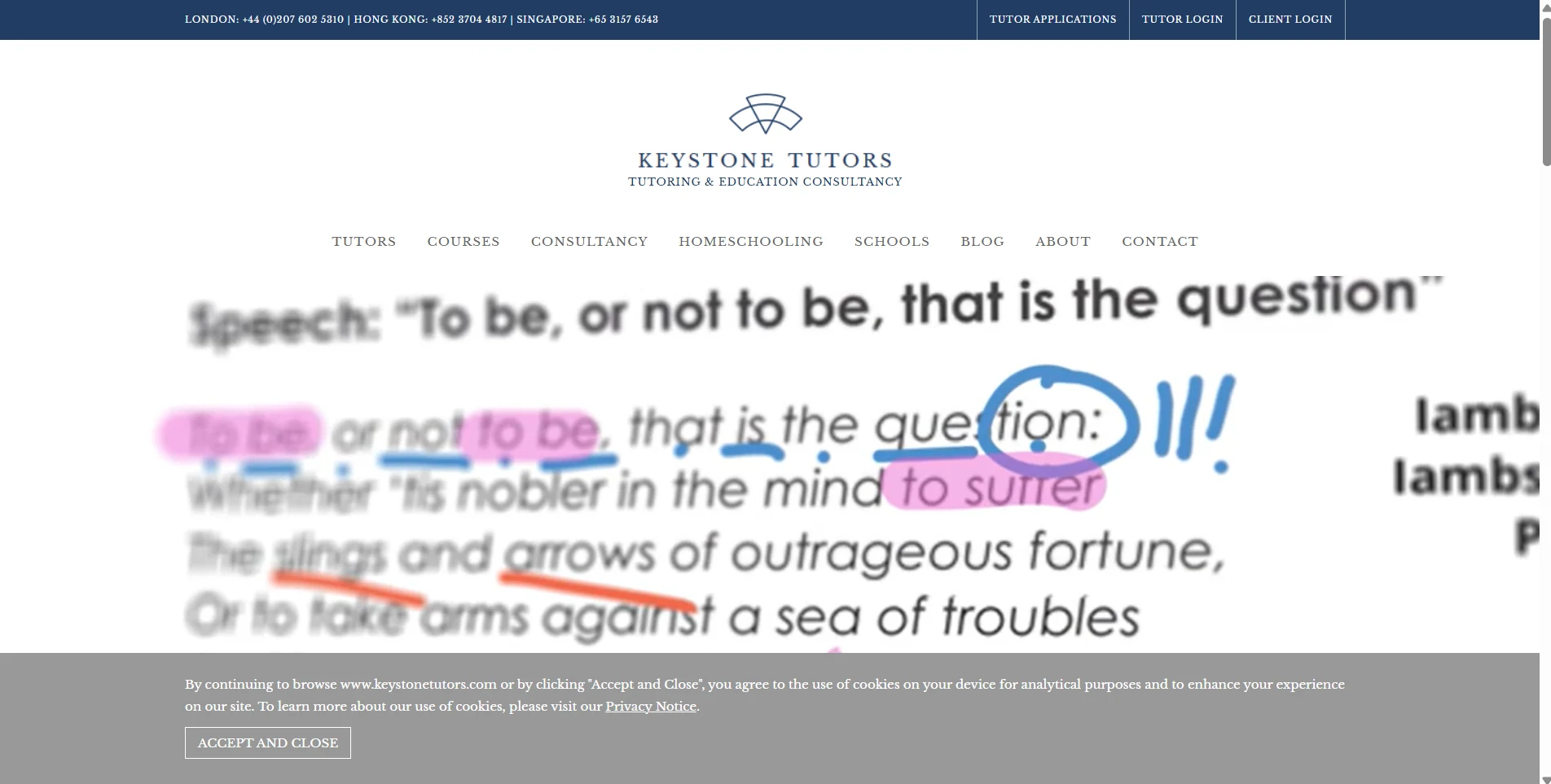
To get a quick overview before diving into details, here’s a visual snapshot of Keystone Tutors. It highlights the key fit, pricing signal, and what to watch for.
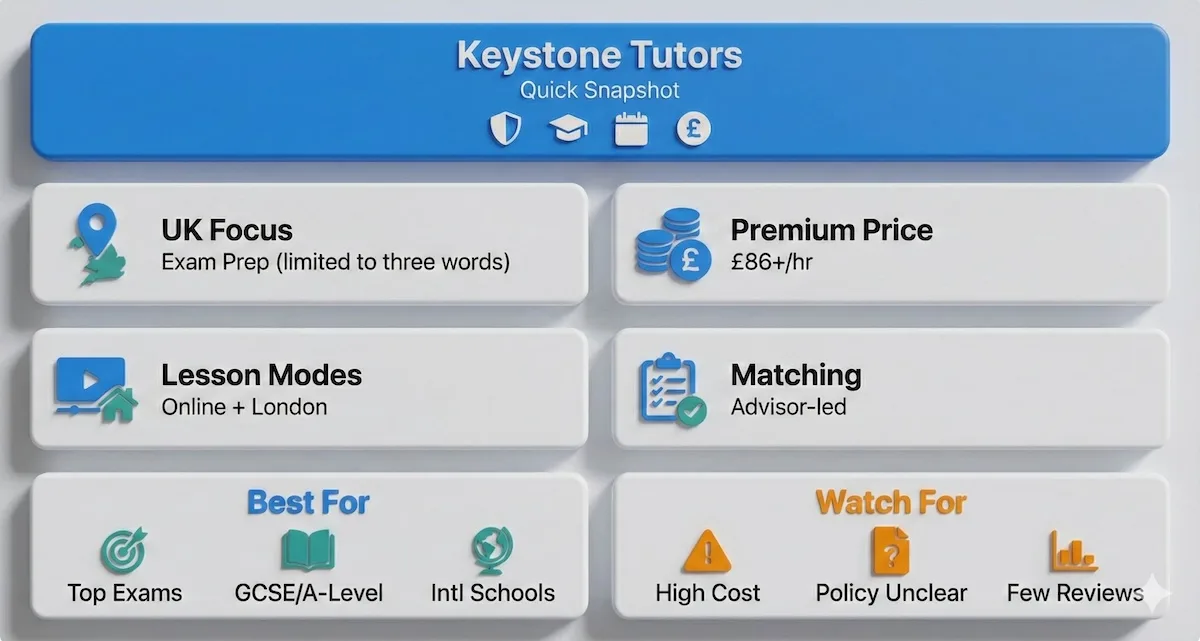
This Keystone Tutors snapshot highlights who it fits best, delivery modes, and premium pricing at a glance.
Use this snapshot to decide if Keystone’s premium model matches your goals before comparing alternatives.
Keystone Tutors Reviews and Testimonials
Keystone Tutors generally receives positive feedback for tutor quality and support. We found limited independent reviews online. In the UK Trustpilot page it has 1 review (rated 3/7) praising the tutors as “professional and truly helpful,” but no negative comments. On Glassdoor, employee-tutors mention “good hours” and “good money”, noting they manage their own schedule and earn above-average pay. The main complaint is that Keystone takes a large cut (~50%) of tutors’ hourly rates.
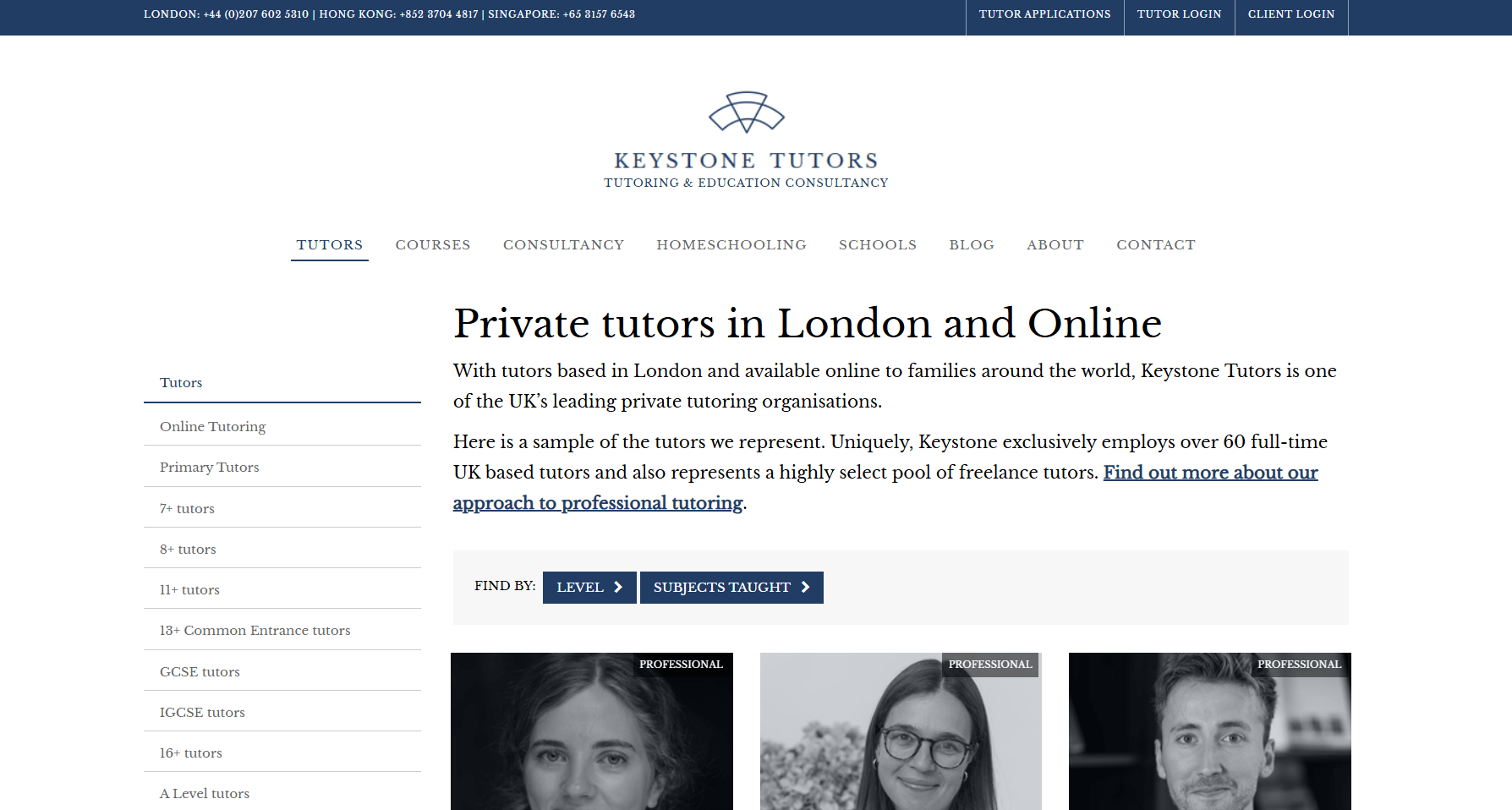
Trustpilot
Keystone has only one Trustpilot review (4.7/5 on 1 rating). That parent review is highly positive: it praises tutors as “professional and truly helpful,” who made lessons enjoyable and boosted the student’s confidence and grades. With so few reviews, it’s hard to judge consistency from Trustpilot. But the lone reviewer was happy, noting the tutor helped her daughter prepare for exams and improve skills.
Glassdoor (Tutors)
On Glassdoor, Keystone has a few tutor reviews (around 3-9 stars). Tutors say they like the flexible hours and ability to manage their own schedules. One said they average ~12 hours/week and earn bonus pay after a base amount. However, tutors also complain about Keystone’s large commission: about half of the hourly fee goes to the agency. Some note they have to apply for each job and may not get full hours year-round.
Their Own Website
Keystone’s official site publishes many glowing testimonials. Parents and students consistently praise the quality of tutors and the improvements they see. For example, one parent said Keystone’s tutor was “an excellent teacher” who made lessons enjoyable and helped their child gain confidence. Another review thanked a tutor for giving their son “incredible support” in maths, making him feel “calm, prepared and confident” for exams. Overall, on-site reviews emphasize professional, engaging tutors who deliver better grades and confidence.
Is Keystone Tutors legit? Yes, Keystone Tutors is a legitimate UK company. It is a registered Keystone’s site does not clearly state a refund or cancellation policy (company number and address listed on its site). It’s been operating since 2007 and has served over 10,000 students. Keystone is endorsed by educational bodies (HMC) and has positive word-of-mouth. We did not find any evidence of scams or major complaints online, so it appears to be a trustworthy tutoring agency.
Summary: Keystone Tutors has mostly satisfied customers and tutors. Independent reviews (Trustpilot, Glassdoor) highlight very good tutors and flexible scheduling, while noting the service is expensive. Official testimonials on their site back up the positive claims. Overall, Keystone seems reliable and well-regarded for its niche market (UK-style exam tutoring), but families should be aware of its premium pricing.
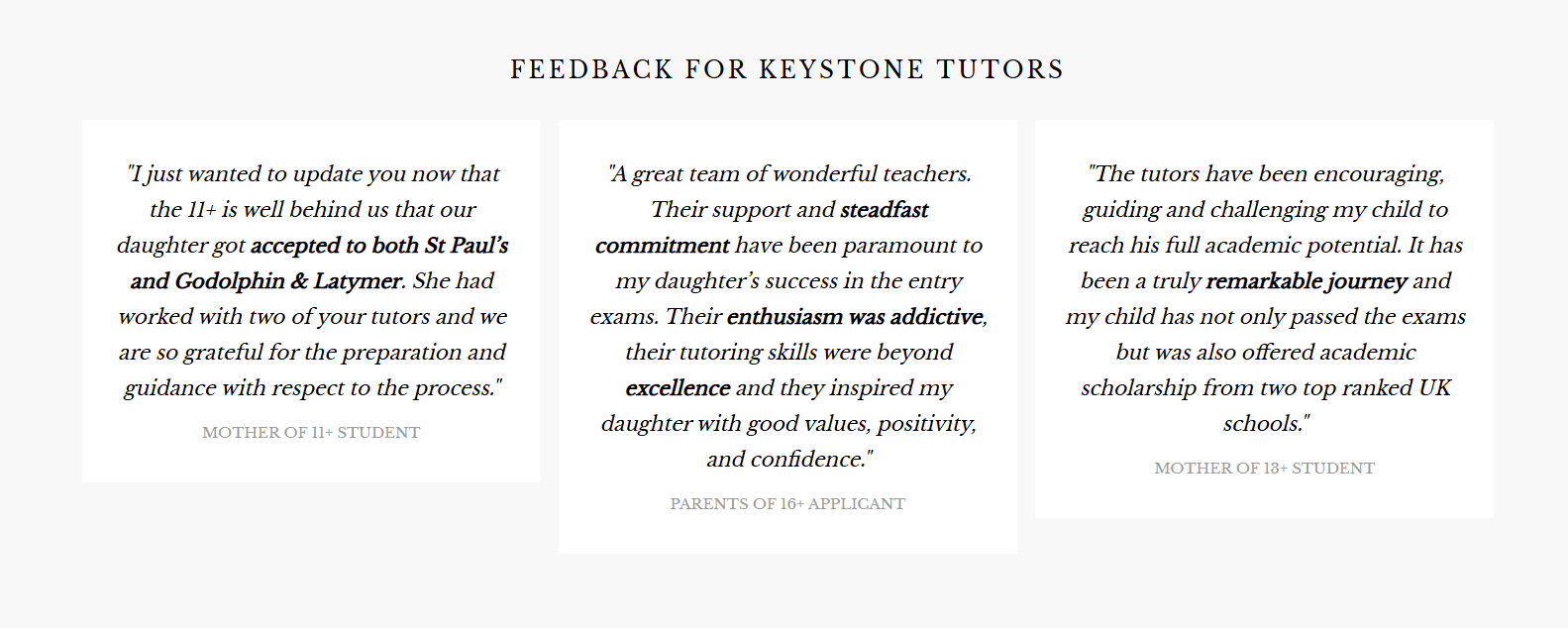
Reviews can be confusing when sources vary in volume and credibility. This dashboard helps you compare review signals across platforms at a glance.
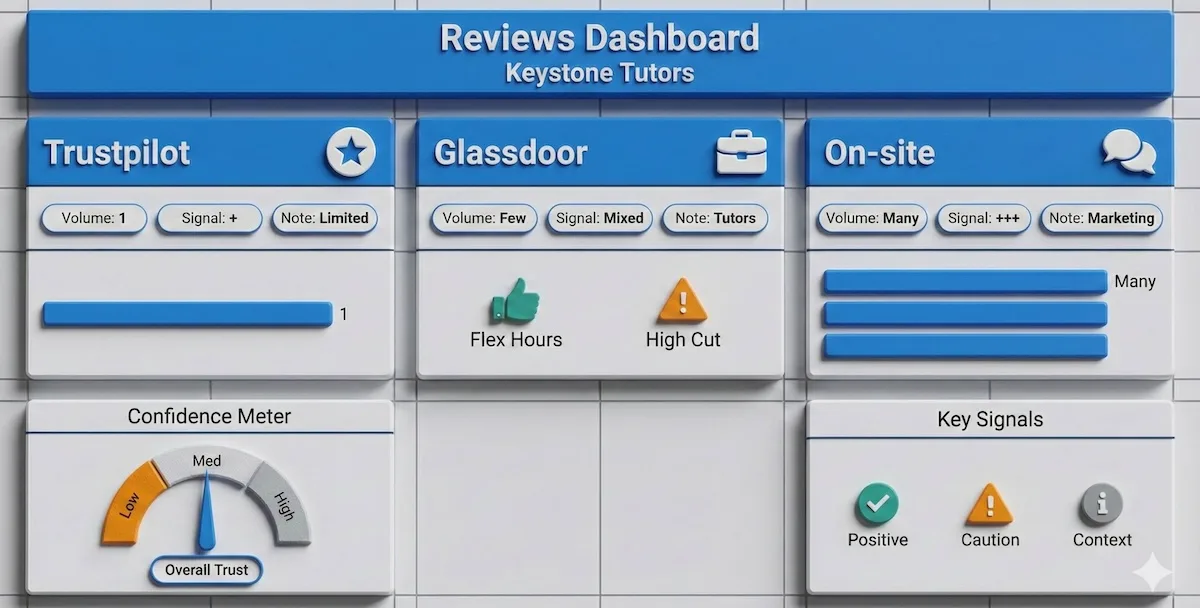
This dashboard summarizes Keystone Tutors review signals across sources, highlighting volume limits and overall trust confidence.
Use the review dashboard to balance testimonials with independent review availability before you decide.
Keystone Tutors Pricing
Pricing Range
Keystone’s rates are on the high end, reflecting its premium service. Private one-to-one tutoring starts at about £86 per hour in the UK (roughly $100–$110 USD). Group or online courses begin around £35 per hour. A tutoring blog notes that fees typically “hover around £100 per hour” for most lessons. If you look at specialized programs (like homeschooling), Keystone cites rates from £82 to £162 per hour (including VAT) depending on tutor experience. In general, the best-qualified tutors (often ex-teachers or exam specialists) charge more, while less-demanded subjects or junior tutors might be at the lower end of the scale.
- One-to-One Tuition: Starts ~£86/hr (UK prices) (top tutors may charge up to ~£100–£150/hr). In USD this is roughly $100–$180 per hour. (These rates cover core subjects like math, science, English at school/college level.)
- Online Group Courses: Start at £35/hr, aimed at exam prep or skill courses. These are cheaper since tutor cost is shared.
- Homeschooling Programs: Full packages at £82–£162/hr (inc. VAT), which vary by tutor seniority. Homeschooling often involves more specialized tutor input, hence higher rates.
For example, one source notes that top tutors on Keystone often charge around £100/hr. Overall, you can expect most sessions to be $100+ per hour, with some cheaper and some much more expensive depending on the tutor’s credentials. This is higher than general UK platform averages (for context, other UK sites have tutors at £20–60/hr). Check Keystone’s contact page for exact pricing (they do not publish all rates online).
Pricing is easier to understand when you can see ranges side by side. The chart below summarizes Keystone’s pricing and includes a simple cost estimator.
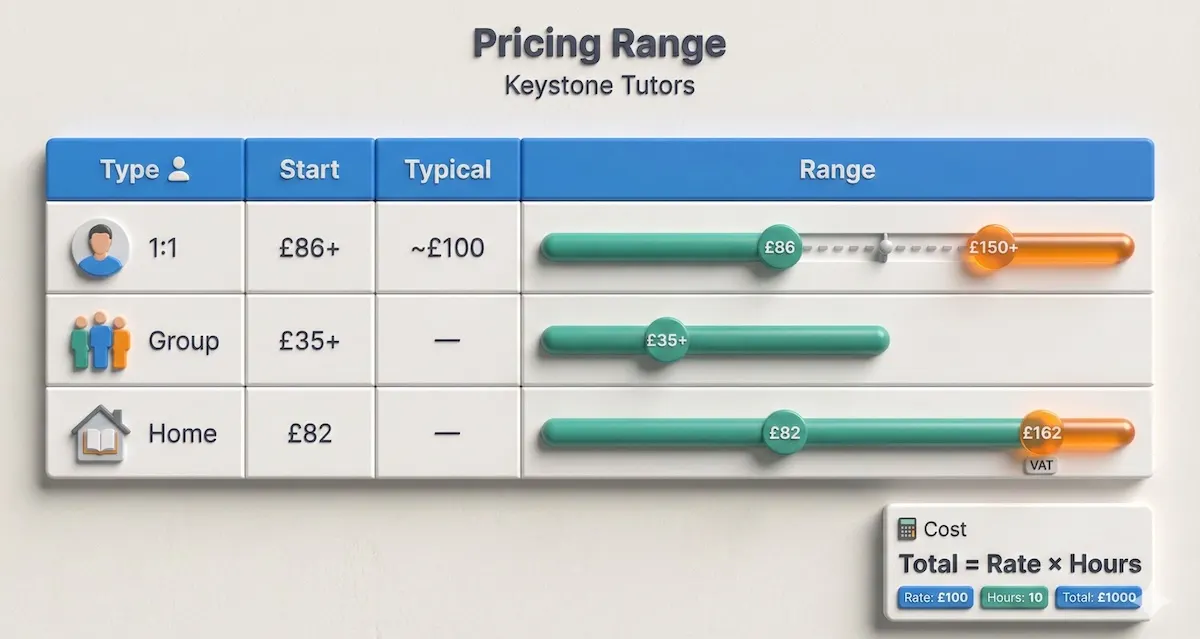
Use this Keystone Tutors pricing chart to compare lesson types and estimate total tutoring cost by hours.
Once you estimate total cost, you’ll be able to compare alternatives more realistically.
What students say about Keystone’s pricing
We found no direct student comments on Keystone’s site about price. However, comparing industry norms suggests Keystone’s fees are premium. Tutoring sites in the UK often have rates from £20 to £60 per hour for standard tutors. Keystone’s £80–£100+ rates are much higher, reflecting its elite positioning. In our view, this is justified only if the tutors truly deliver top results. Since Keystone targets high-achieving students, families likely expect higher costs. We didn’t see complaints about unfair pricing, but some might find it expensive compared to other platforms.
Hidden costs
Keystone does not list any extra registration fees or surprise charges on its public pages. There is a free initial consultation and no obvious sign-up fee. We found no mention of cancellation penalties or mandatory packages on their site. In short, the pricing seems straightforward: pay the hourly/session rates as agreed. (We did not see any reports of hidden fees in reviews either.)
How Keystone’s pricing works
Keystone handles payments directly between student/parents and the company. They do not publicize payment methods, but likely accept major credit cards or bank transfers through their portal. Tuition is usually prepaid: you buy blocks of hours or sessions in advance. We saw no evidence of subscription plans or discounts for bulk lessons, except that homeschooling is sold as a program. Keystone also advertises a free introduction session on request, but beyond that, they do not list promos. They do not mention special discounts (e.g. no explicit military or low-income rates were found). In summary, payment is per-session upfront, with no pay-later or subscription model noted.
Free Trial
Keystone does not offer a formal free trial lesson as far as we can tell. There is no mention of a free trial or first-lesson guarantee on their website. (Students would pay for the initial session like any other, after the consultation.)
Refund policy
Keystone’s site does not clearly state a refund or cancellation policy. We did not find a dedicated page about refunds. Without an official policy, it’s unclear if dissatisfied students can get money back. We also found no user discussions (on forums or social media) complaining about refusing refunds or overcharging. In absence of info, assume no guarantee: payments are likely non-refundable once the service is delivered.
Before paying for tutoring, it helps to run through a quick checklist so you don’t miss fees or policy details. This flowchart shows the exact questions to confirm first.
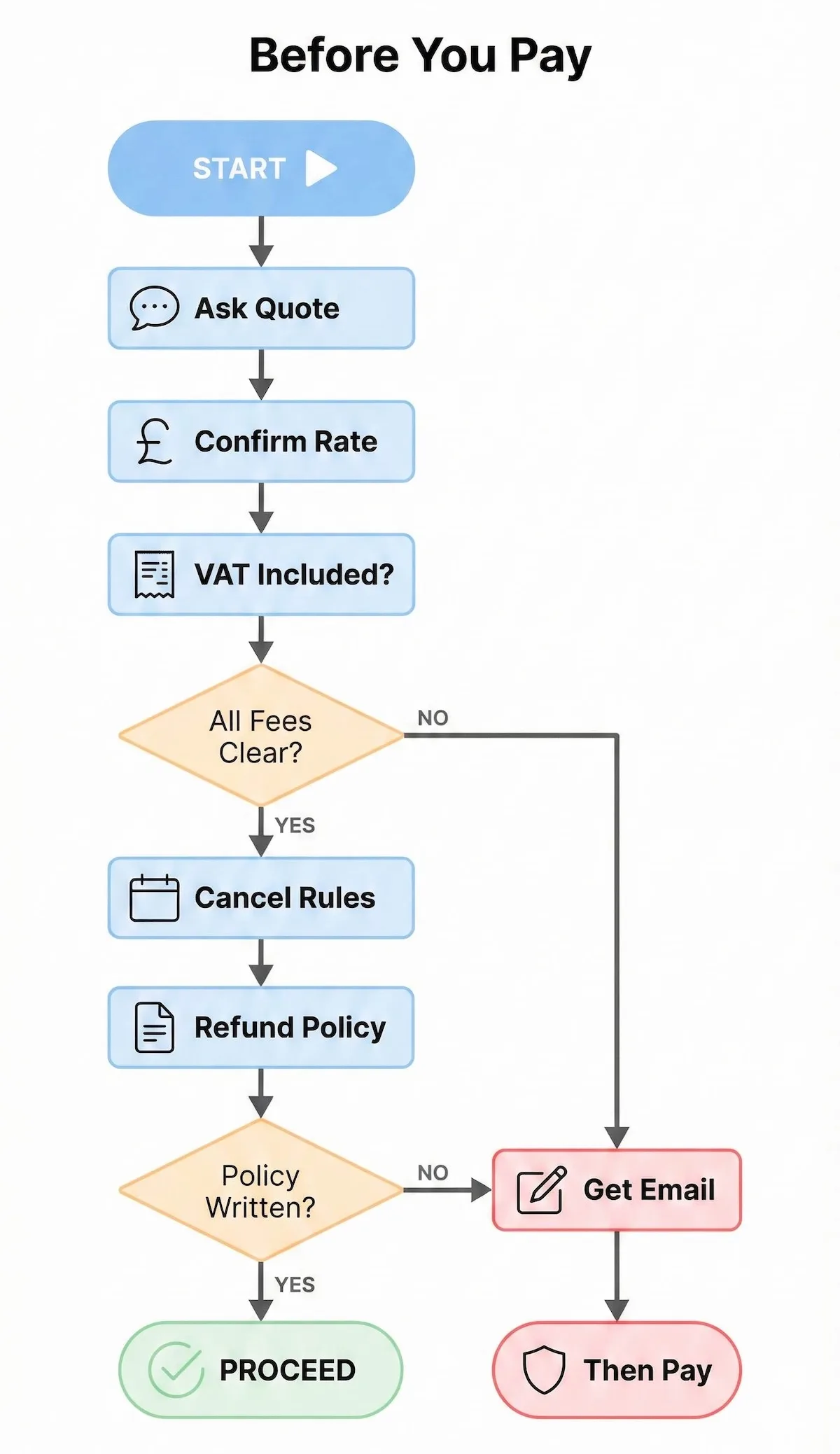
This Keystone Tutors checklist flowchart shows the key fee and refund questions to confirm before payment.
A quick policy check up front can prevent surprises later.
Keystone Tutors Alternatives
Students and parents often compare Keystone to other tutoring options. Alternatives may be sought for lower costs, different subject focus, or simpler booking. Below are a few popular alternatives to consider:
Summary of alternatives: Many students might look for alternatives if Keystone’s pricing or offerings don’t fit. Some top alternatives include Wyzant (US-based tutoring marketplace), Varsity Tutors, Chegg, Course Hero, and of course My Engineering Buddy (MEB). These differ in price models, subjects, and tutor profiles. For instance, MEB is strong in STEM subjects and tends to have lower rates. The list below highlights each alternative’s pros and cons compared to Keystone.
If you’re deciding between Keystone and other tutoring options, side-by-side comparison is the fastest way to choose. This table highlights differences in model, pricing level, and best use case.
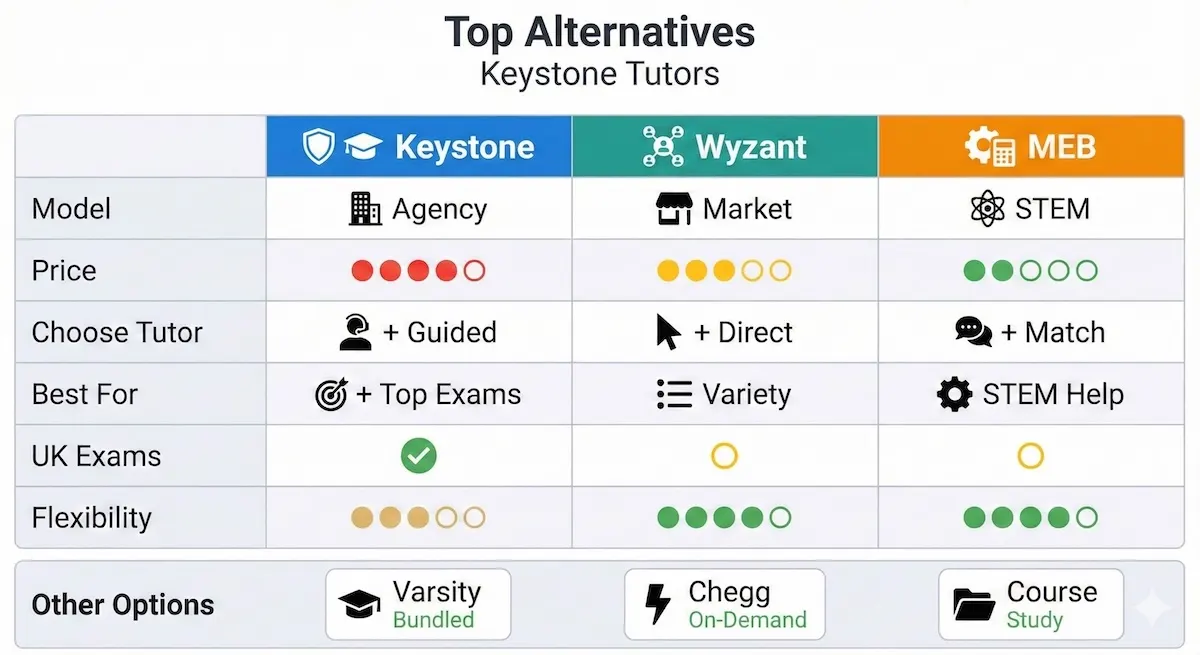
Compare Keystone Tutors with Wyzant and My Engineering Buddy to choose the best fit by budget and goals.
Choose the platform type that matches your budget and learning goal, then shortlist 1–2 services to test.
Wyzant
Pros: Wyzant is a large US tutoring marketplace with thousands of tutors across many subjects. Tutors set their own rates (commonly $30–$70/hr), and Wyzant adds a 25% platform fee. This means you can often find tutors cheaper than Keystone’s base, especially for basic subjects. Scheduling and matching are very flexible (you pick from a list of tutor profiles). Cons: Quality varies widely since tutors are freelance. There is no central vetting beyond user reviews. Wyzant also doesn’t focus on UK exam prep. Keystone, by contrast, hand-picks and trains its tutors (full-time, professional staff) so tutor quality is more consistent. Wyzant’s refund option is also limited (no guaranteed-free trial).
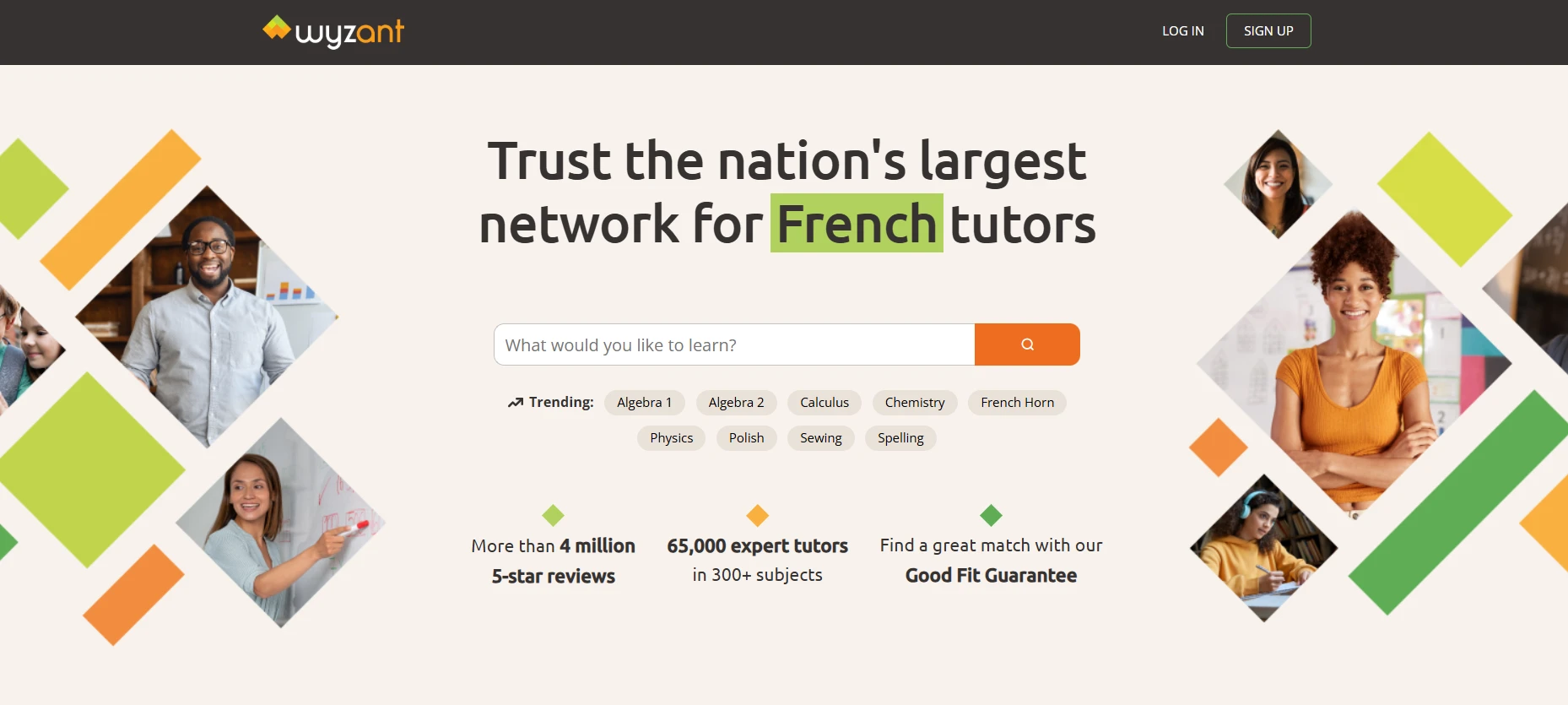
Varsity Tutors
Pros: Varsity Tutors offers a wide range of subjects (K-12 to college) and uses an online platform similar to Keystone. They also match you to vetted tutors. Pricing is often quoted per subject; average US tutoring rates are ~$70–100/hr (comparable to Keystone’s rates) but sometimes with discounts or pass options. Cons: It is US-centric, so not ideal for UK curriculums. Varsity Tutors also often requires purchase of session bundles or subscriptions. Keystone has a simpler pay-per-hour model. Users report that Varsity’s platform fees make it also quite expensive.
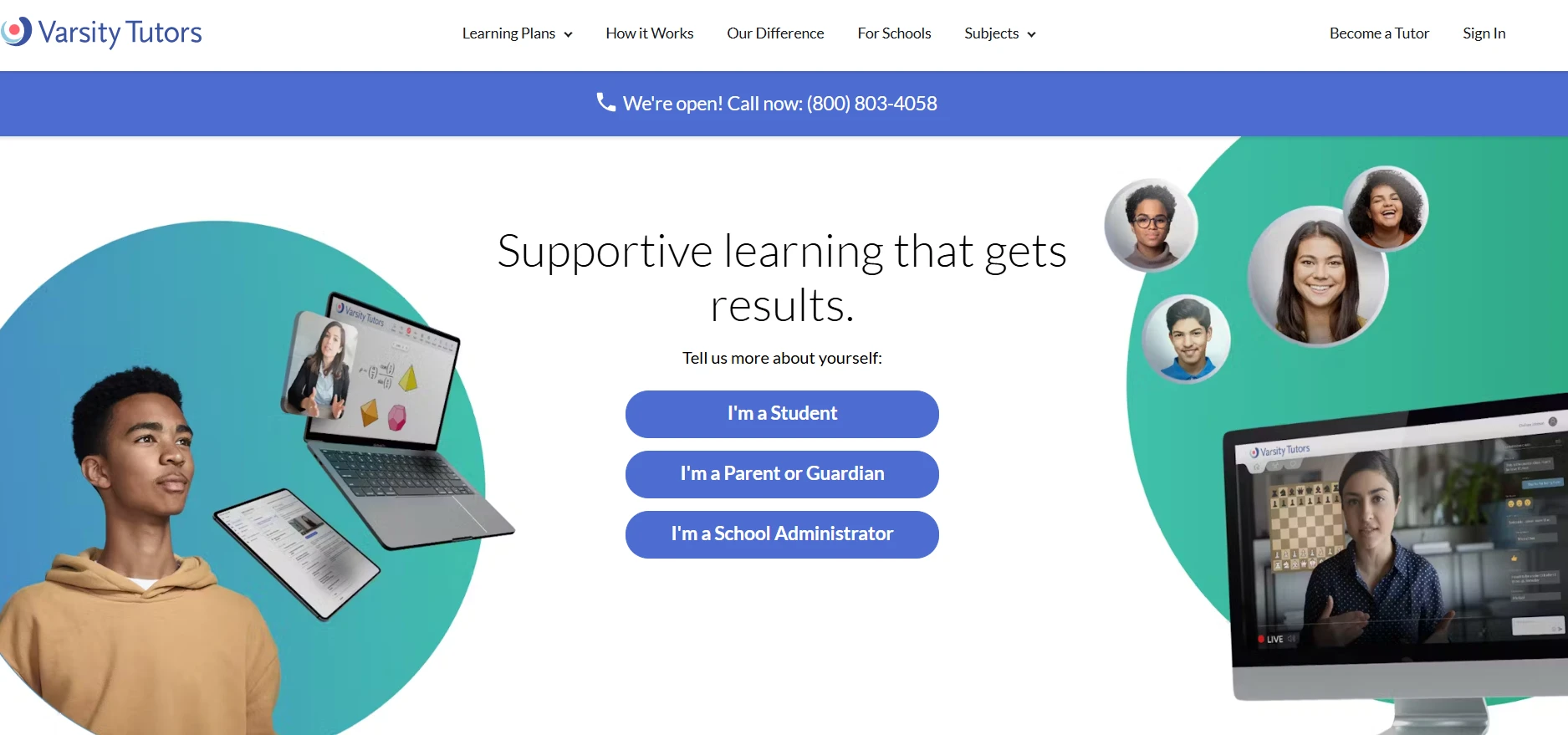
My Engineering Buddy
Pros: My Engineering Buddy (MEB) specializes in STEM subjects and engineering at college level. It is known for having friendly tutors who simplify tough concepts – one review said an MEB physics tutor made “tough problems easy to understand”. MEB offers 24/7 global support via chat/WhatsApp and flexible pay-as-you-go pricing that some students find “fair and stress-free”. It typically has lower hourly rates than Keystone (often $10–$30/hr). Cons: MEB has fewer tutors and less focus on British exam prep. It may not cover as many humanities or early-school topics as Keystone. However, for advanced technical courses, MEB’s personalized homework help can be a big advantage.

Chegg Tutors
Pros: Chegg offers on-demand homework help and tutoring via an online platform. It’s cheaper – subscription plans are around $20–$30/month for limited help, and one-on-one tutoring is roughly $30/hr. They have many tutors including college students. Cons: Chegg is not focused on long-term exam prep or college admissions. Sessions are typically very short-term (pay-per-question or hour). Keystone’s model is for planned tutoring over weeks, which Chegg doesn’t emphasize.
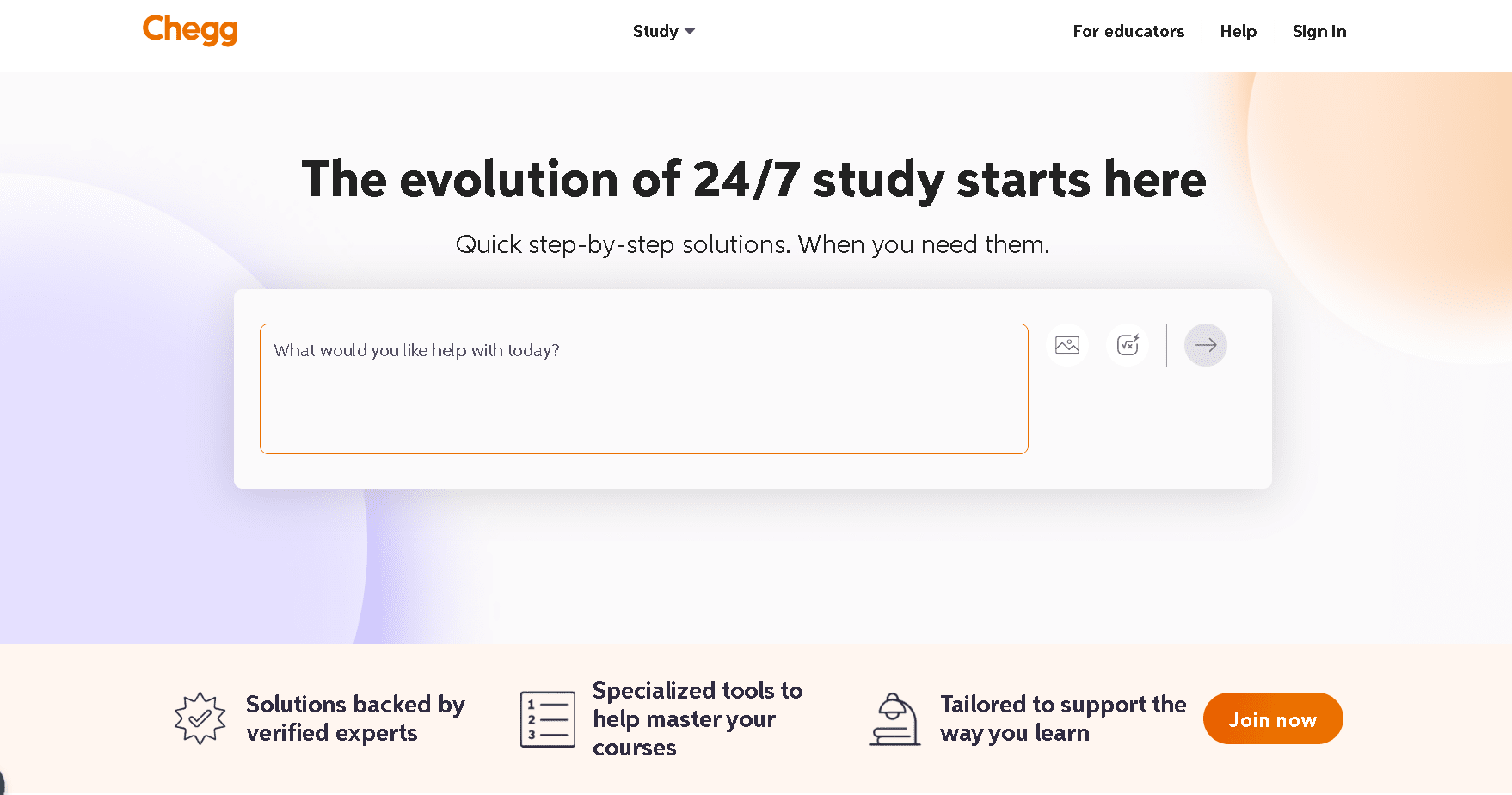
Course Hero
Pros: Course Hero is mainly a study resource site (notes, Q&A) with some tutoring-like help. It’s inexpensive (about $9–$40/month). It provides 24/7 access to tutors through answers. Cons: It lacks personalized one-on-one tutoring sessions. It’s more for quick answers and study aids. Keystone’s full tutoring service (with live lessons) is far more comprehensive. Course Hero is a very different model but can supplement learning.
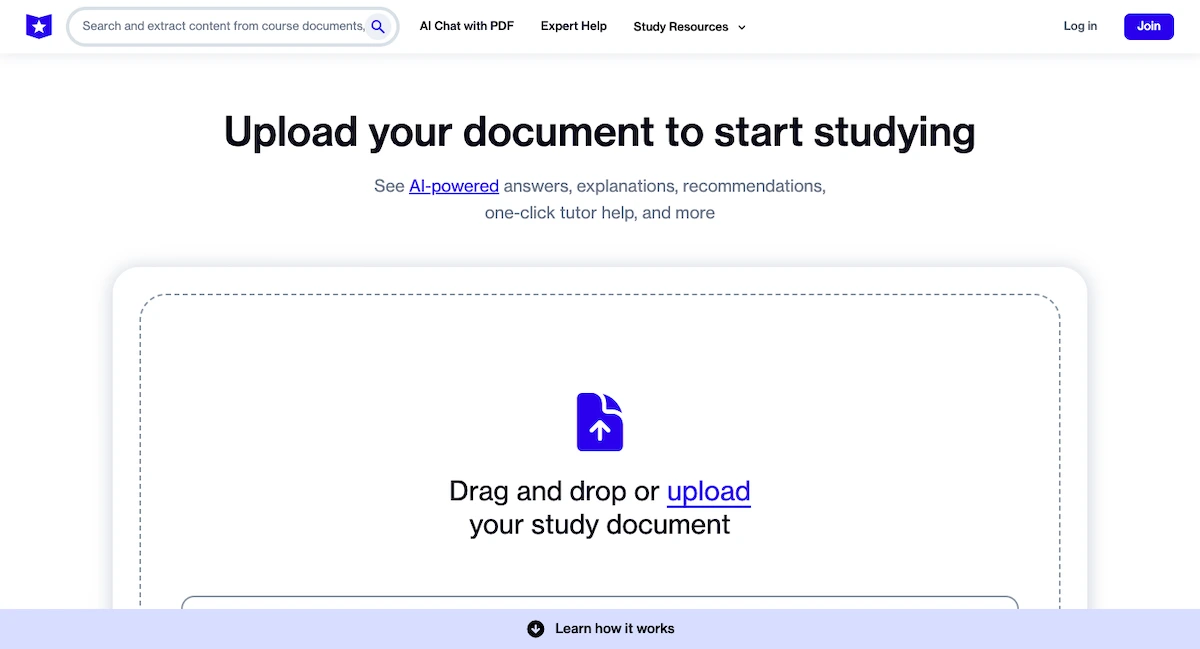
How it Works?
A. For Students
Students or parents start by contacting Keystone (via website or phone) and explaining the student’s needs (subject, exam level, schedule). Keystone then suggests one or more suitable tutors. The family reviews tutor profiles and chooses a tutor. Once chosen, Keystone arranges an initial “launchpad” meeting between the tutor, student, and parent to set goals and expectations. After that, regular live lessons begin (usually online, although in-person is possible in London). The platform’s web interface and whiteboard let students and tutors interact in real time and share resources. Scheduling is coordinated by Keystone, and students simply book sessions through their portal or with an advisor.
B. For Tutors
To become a tutor, candidates apply through Keystone’s website (“Apply Now to Become a Tutor”). Keystone hires both London-based professional tutors (on salary) and freelance tutors. Applicants typically need a strong degree (2:1 or better) and teaching credentials (PGCE, etc.). Tutors undergo a rigorous vetting process (ID/DBS checks, interviews, trial lessons) before being accepted. Once hired, tutors are matched to students by Keystone’s staff; tutors do not set their own rates (they are paid by Keystone). Full-time tutors have a base salary (£22,500–27,000 for 13h/week) and can earn more by teaching additional hours (they typically do 50–75 hours/month). The company provides professional development and administrative support, so tutors focus on teaching. Interested tutors can start on Keystone’s site via the “Tutor Applications” link.
Keystone’s process differs depending on whether you’re a student or a tutor. This two-lane diagram breaks down both journeys step by step.
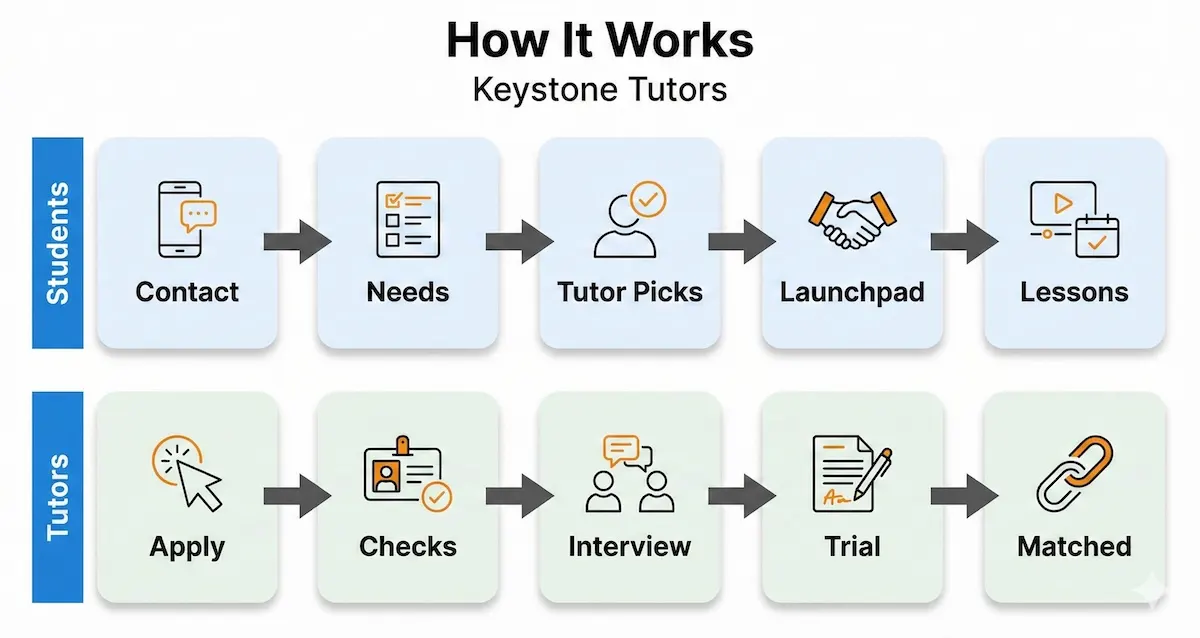
This process diagram explains how Keystone Tutors matches students and vets tutors, from first contact to ongoing lessons.
Understanding the full workflow helps you know what to expect before scheduling sessions or applying to tutor.
FAQs About Keystone Tutors
How does Keystone Tutors compare to My Engineering Buddy? Keystone is a UK-based agency with mostly UK/Oxbridge-focused tutoring and high fees, while My Engineering Buddy is a global platform focused on STEM subjects with lower hourly rates. Keystone uses its own full-time tutors, whereas MEB uses a worldwide tutor pool.
Is Keystone Tutors legitimate and trustworthy? Yes. Keystone is a registered UK tutoring company (est. 2007) with offices in London, Hong Kong and Singapore. It has served over 10,000 students and has endorsements from academic organizations. Reviews are generally positive with an average rating around 4.9/5 on its cited pages, and we found no evidence of fraud or complaints.
How much does Keystone cost? Its tutoring rates start around £86 per hour in the UK. According to sources, the typical price is ~£100/hr. Group classes start at £35/hr. In USD terms, 1:1 sessions are roughly $100–$150/hr for most tutors. These rates are higher than many online platforms, reflecting Keystone’s premium service model.
Where is Keystone Tutors based? The company is headquartered in London, UK, with additional offices in Hong Kong and Singapore. It primarily serves English-speaking students in the UK, Hong Kong, Singapore and other international schools, although all sessions can be done online anywhere.
Do they offer in-person tutoring? Yes, Keystone provides both online and in-home tutoring. In-person sessions are mainly for students in and around London (tutors travel to students’ homes). Outside London, tutoring is usually online via video (using Skype/Zoom and an interactive whiteboard).
What subjects and levels does Keystone cover? Keystone covers a wide range of academic subjects at all school levels. They offer tutoring from Primary and school entrance exams (7+, 11+) up to GCSE/IGCSE and A-Level/IB subjects. They also handle university entrance prep (Oxford/Cambridge tests) and undergraduate courses. In practice this means maths, sciences, English, languages, humanities, and specialized exam prep for British curricula.
Conclusion
Keystone Tutors’ strengths lie in its highly trained UK-based tutors, personalized matching process, and strong focus on exam success. It caters to students aiming for top grades or university entry exams. The weaknesses are its high cost and primary focus on UK-style education. By contrast, My Engineering Buddy excels with more affordable rates and specialized STEM tutoring, which may suit students in engineering or technical fields. Overall, Keystone is a reputable premium tutoring option, and families needing advanced STEM or round-the-clock help might prefer My Engineering Buddy as an alternative.
Sources: Our information comes from Keystone’s own site and credible third-party reviews.
******************************
This article provides general educational guidance only. It is NOT official exam policy, professional academic advice, or guaranteed results. Always verify information with your school, official exam boards (College Board, Cambridge, IB), or qualified professionals before making decisions. Read Full Policies & Disclaimer , Contact Us To Report An Error
